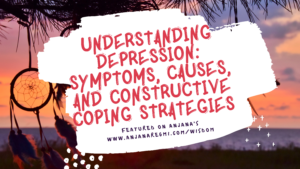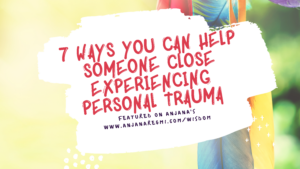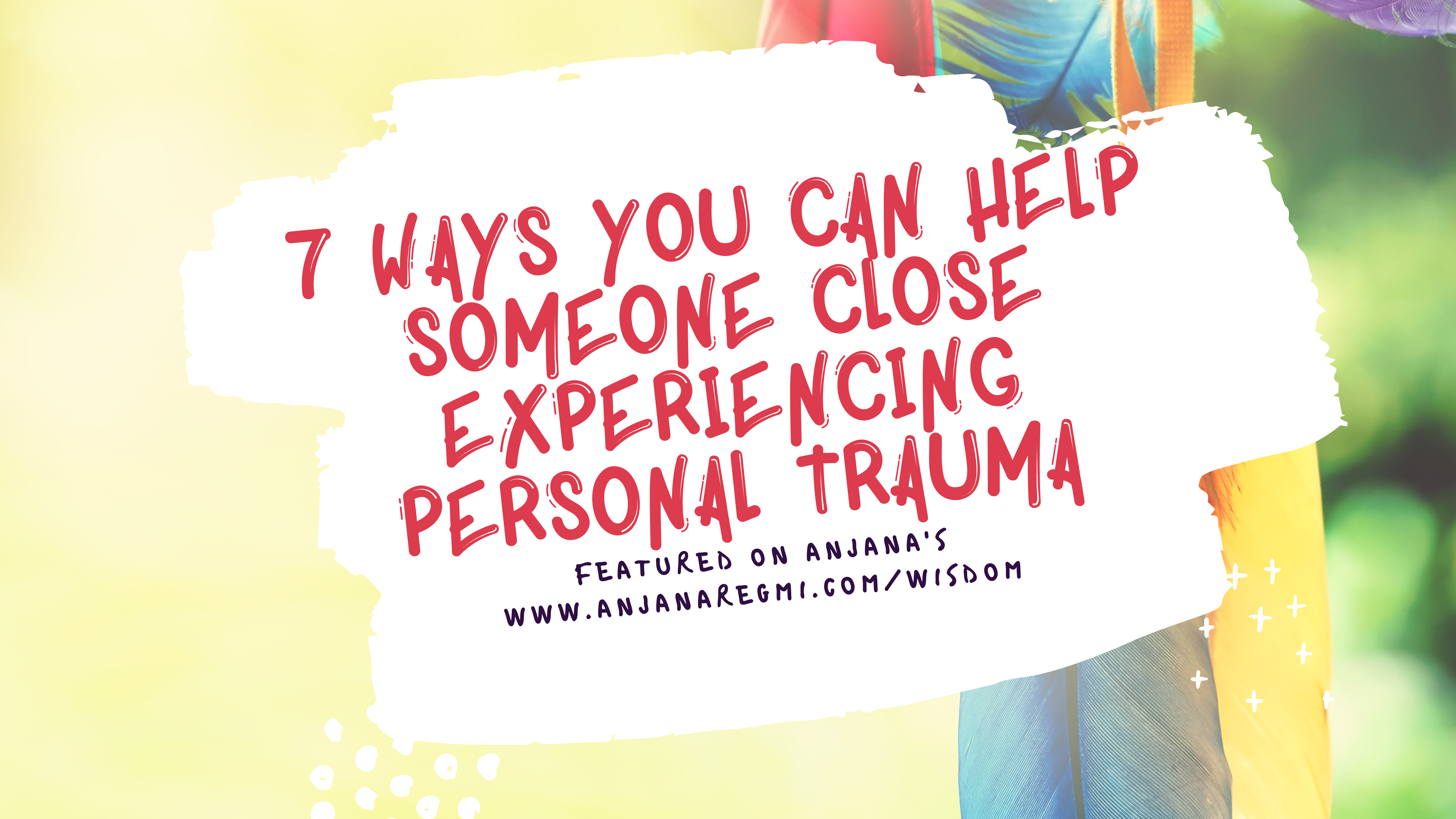7 Ways You Can Help Someone Close Experiencing Personal Trauma
What to do when someone close to you experiences a personal trauma?
Trauma and life transitions can be some of the most difficult times someone can experience, often accompanied by intense feelings of distress and confusion. Mental health challenges like trauma don’t just affect individuals – they also deeply impact those around them. At times, it may seem daunting to know how best to support someone close who is going through personal trauma or major life transitions.
No one should have to suffer alone, especially in times of personal trauma. Whether it’s a mental health issue or the train of an unhealthy relationship, often we are uniquely positioned to offer support to those we love most. Being aware of your own capacity and limits is key; however, check-in with someone close who needs help can make all the difference in their healing journey.
If you have a friend or loved one that is going through tremendous personal trauma, it can be difficult to know exactly how to provide support. It may feel like nothing you do is ever enough, as if all of your attempts at addressing the issue are constantly falling short and leaving them feeling discouraged. While understanding their situation and offering unwavering support are fundamental ways to help someone going through personal trauma, there are many other ways to extend comfort during these times of distress.
The nature of life is such that, occasionally, we all experience traumatic events. We don’t mean for them to occur – they just do. And when a close family member or friend suffers from an upsetting event, it’s important to know what to do to help them through the aftermath.
Many times it begins by observing shuttle changes in their behaviour, thought process, response to life events or even everyday interactions.
Is there anything unusual about the way they’re coming across to you?
What’s unusual about their everyday routine? A few common theme for people experiencing difficulties is sleeping habits, eating, sudden weight loss or gain, withdrawal or over-committing to things like work or studies, etc.
When you’re in this position to offer help, you’ll feel unsure, confused, and may not know what to do or say to help. It gets tough when the person experiencing personal trauma is habitually into
In this blog post, I’m sharing 7 actionable tips on how you can help a loved one during challenging personal circumstances. With these strategies in mind, I hope you will walk away with a improve sense of confidence as you help others struggling with mental health challenges or other sources of turmoil.

Is s/he usually quiet? Does s/he talk your leg off normally? Consider how they might respond to the troubling event they’ve recently experienced. Knowing their typical behaviours and how they usually react in stressful situations can give you an idea of how to provide appropriate support. For this stay present in your relationships and friendship. It allows you to have a better understanding of the emotions they are feeling and what methods would be effective for helping them.
- Anticipating how they will behave will help you be better prepared to be the best friend you can be to your cherished loved one.
When you’re near the person, think about what you could do to help them most. Focus on your efforts. Do they usually enjoy going for a walk or out to coffee? Maybe they’ve always loved going to lunch at a particular restaurant. You can be supportive by inviting your friend to do things they enjoy.
If s/he doesn’t appear interested, consider inviting her to a quiet dinner and evening watching a movie at your house. Going to your home might be a more relaxing, less overwhelming experience for your friend than going out.
- Allow your loved one to move at their own pace. They must experience their journey as they choose.


Sometimes, a statement as simple as, “I’m so sorry this happened to you” can be all that’s necessary to give your friend the opportunity to talk openly about how they feel. It acknowledges that your friend is feeling emotional pain and validates their feelings. A sincere expressions of understanding or sympathy can serve to comfort them, providing psychological support during what may be a difficult time in their life.
- Giving this simple “sorry” also provides important acknowledgement to your friend that you recognise he’s been through a major event in this life. Doing so is at least one step closer to showing you’re interested in understanding how he feels.
Tell your friend you’ll be there for them at any time. Make it clear your friend is free to call you or drop by to your home whenever s/he feels like it. Even though it might take some effort on your part to be on stand-by for them, later on, you’ll be glad you did.
One way to do this is by expressing your commitment and willingness to help in a thoughtful and genuine way. It is important to be mindful of language when communicating with your friend, ensuring that any words used don’t imply pity or judgement.
- Strive to do whatever it takes to come to their aid.


Having someone who is struggling with depression or another mental health issue can be difficult. However, there are ways you can help them maintain a positive outlook.
One way to do this is by normalising and sharing your daily activities with them. By showing them that you’re going about your day in a normal, healthy way, it can help to remind them that their situation isn’t as hopeless or out of the ordinary as they may think. Talk about the book you’re reading or how your kids are doing in school. Hopefully, your friend will do the same. Be positive.
Taking this step will begin to normalise your friend’s life again, which is usually welcomed, given the unusual trauma they’ve recently experienced.
When someone is struggling with trauma, it can be helpful to have someone to talk to. Listening is an important part of this process – listening without judgement or offering advice. Simply allowing someone to express their feelings and experiences can be incredibly therapeutic.
Through listening, people can gain a better understanding of themselves and their experiences, which can lead to increased self-awareness and emotional healing. Listening also helps to build trust and connection, providing space for individuals to feel safe enough to open up about their traumas so that they can start the journey of overcoming them.
- As long as you’re listening, they know you care.


Patience is an invaluable attribution when supporting someone experiencing a traumatic event. Remember the times when you experienced emotional trauma – death in the family, break-ups, financial loss, etc. How did you recover from it and how long did it take? Patience allows the person to take the necessary times to process, understand, and come to terms with what has happened. There’s no defined timeline for getting over a traumatic event.
Therefore, having patience will enable your friend to re-blossom at a pace necessary for him.
When someone you care about experiences a traumatic event, it might take them a long time to fully recover from it. However, you can serve as a great support to encourage your friend to gradually get back into the swing of life.
Following the simple steps above will aid you to provide the special assistance your friend needs to continue peacefully down life’s path. Being there for a person experiencing difficulties creates a supportive environment where the person can safely express their thoughts, feelings, and fears without judgement. Allowing the person adequate space to work through their trauma can help lessen its impact and ultimately allow recovery in a healthy manner.
Many times, someone who’s gone through a troubling time simply wants to talk about it. It’s not even necessary to comment or give your opinion of what your friend has been through.
Your optimism, confidence, and personal fulfilment will prosper when you reach out to help a loved one in need. If you are willing to be there for others even when they can’t find the words or don’t feel ready to talk, this understanding helps create trust and builds resilience against future hardships.
No matter how traumatic people’s experiences are, recovering from them and the renewal of life can be fostered with the support of carefully-chosen loving hands.
Finally, remember that while it is important to offer comfort and reassurance, it’s also vital that you look after yourself during this process so you can continue supporting your friend in the best possible way.

Understanding Depression: Symptoms, Causes, and Constructive Coping Strategies – 2303

Four attachment styles and adult relationships – which one is yours? – 2302

7 Ways You Can Help Someone Close Experiencing Personal Trauma #2301

Can You Overcome Trauma Bonding? #2202

What is Trauma Bonding? #2201




